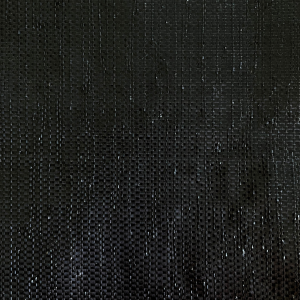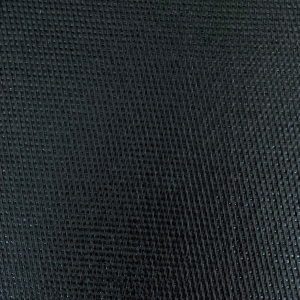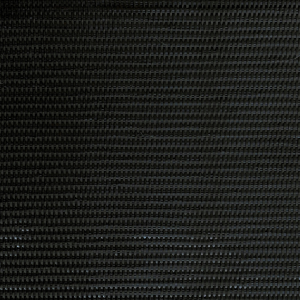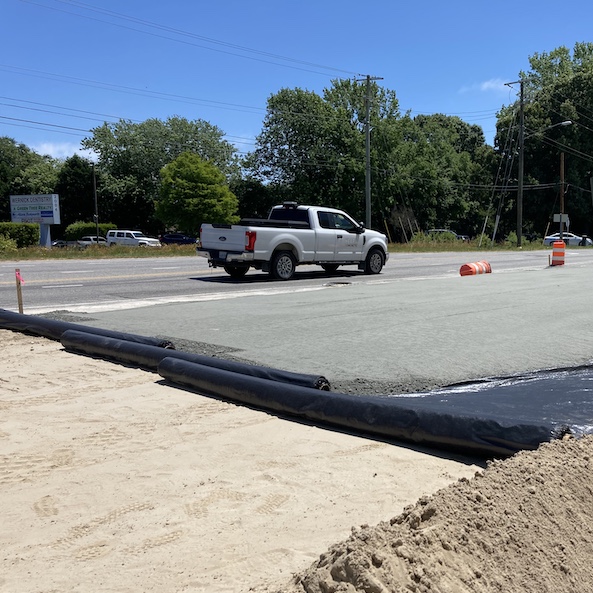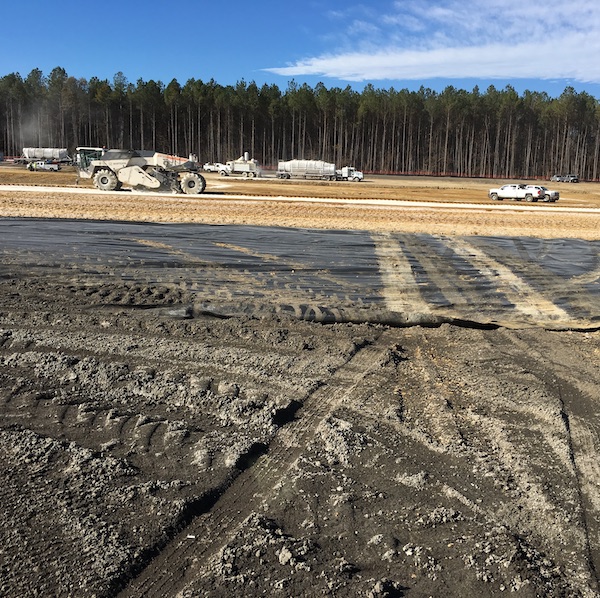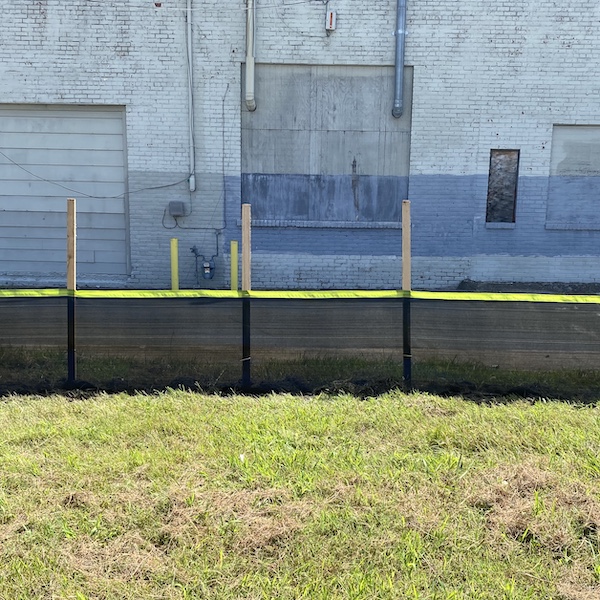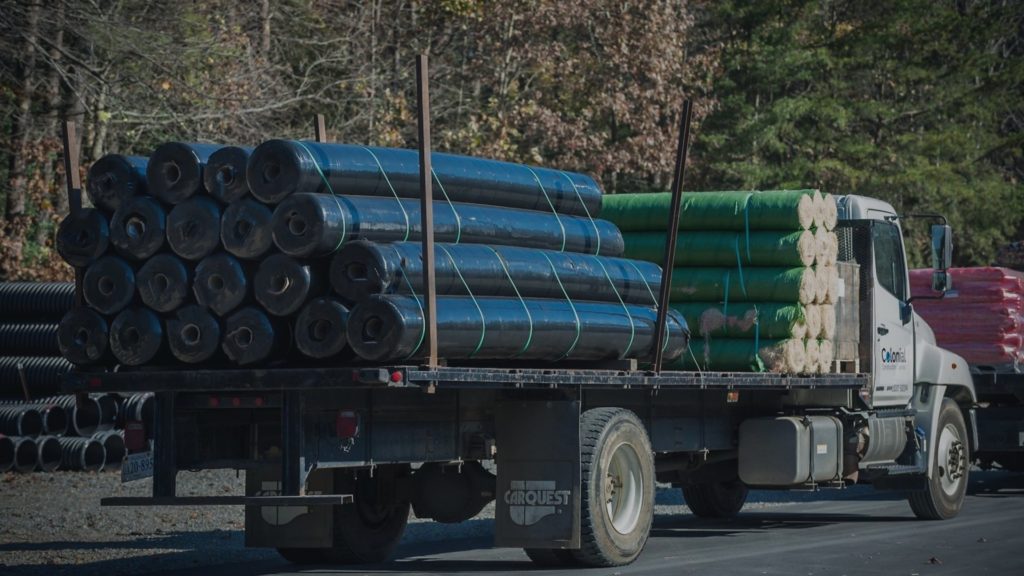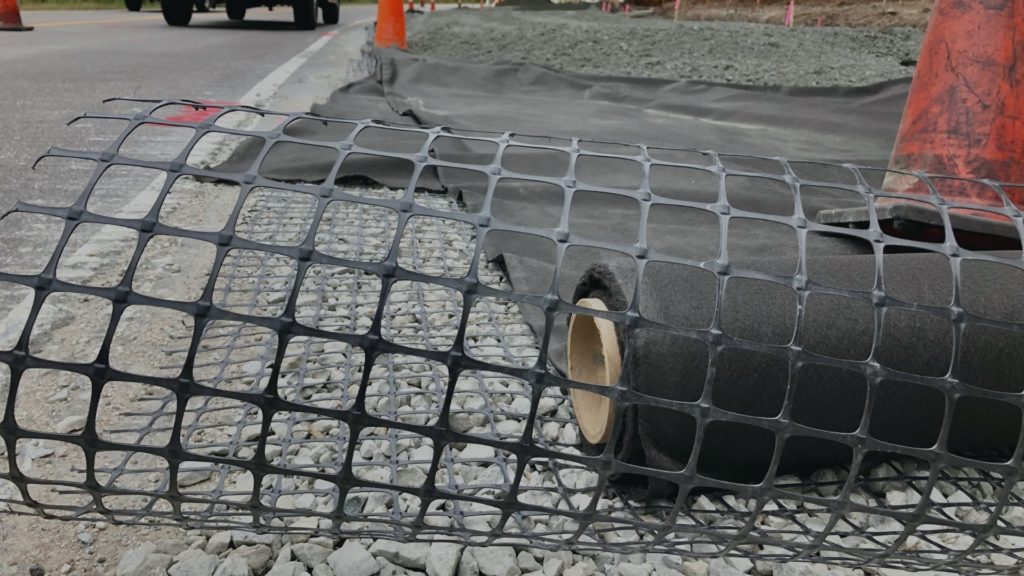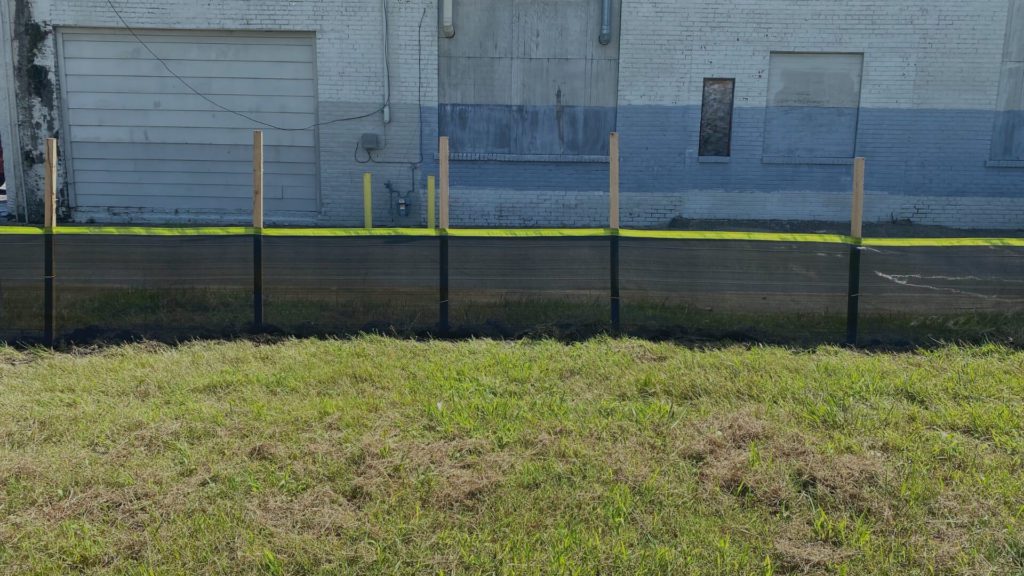Woven Geotextile Fabric
A woven geotextile is made from polypropylene filaments that are woven together to produce a geotextile fabric with strength and permeability. This type of geotextile fabric is commonly used for stabilization, reinforcement and separation.
Woven Slit Film geotextile fabrics are used for stabilization and separation. These fabrics absorb and dissipate tensile force which reduces the ability for soil to deform.
Woven Slit Films include silt fence, road fabric, driveway fabric, construction entrance kits, stabilization fabric and rip rap fabrics.
Stabilization fabrics prevent stone from sinking into the poor soil which could compromise aggregate stability.
| Test Method | SW200 (MARV2) | W250 (MARV2) | SW315 (MARV2) | |
|---|---|---|---|---|
| Grab Tensile | ASTM D 4632 | 200 lbs | 250 lbs | 315 lbs |
| Grab Elongation | ASTM D 4632 | 15% | 15% | 15% |
| Trapezoidal Tear | ASTM D 4533 | 75 lbs | 90 lbs | 120 lbs |
| CBR Puncture Resistance | ASTM D 6241 | 700 lbs | 900 lbs | 1000 lbs |
| Water Flow3 | ASTM D 4491 | 5 gpm/sf | 4 gpm/sf | 4 gpm/sf |
| Permittivity3 | ASTM D 4491 | 0.05 Sec-1 | 0.05 Sec-1 | 0.05 Sec-1 |
| AOS2 | ASTM D 4751 | 40 US Sieve | 40 US Sieve | 40 US Sieve |
| UV Resistance | ASTM D 4355 | 70% / 500 hrs | 70% / 500 hrs | 70% / 500 hrs |
1. The property values listed above are subject to change without notice.
2. Minimum Average Roll Values (MARV) is calculated as the average minus two standard deviations.
Statistically, it yields approximately 97.5% degree of confidence that any samples taken from quality assurance testing will meet or exceed the values described above.
3. At time of manufacturing. Handling may change these properties.
Medium Strength Geotextiles are used on slopes, embankments, roadways, and landfills. These woven geotextiles are produced to support high tensile force. Medium Strength Woven Geotextiles offer excellent subgrade reinforcement over soft soils and poor subgrade conditions.
| Test Method | M220 (MARV2) | M330 (MARV2) | M440 (MARV2) | |
|---|---|---|---|---|
| Grab Tensile | ASTM D 4632 | 295 x 260 lbs | 400 x 350 lbs | NP |
| Grab Elongation | ASTM D 4632 | 15% | 15% | NP |
| Wide Width Tensile | ASTM D 4595 | 2640 x 2640 lb/ft | 3600 x 3240 lb/ft | 4800 lb/ft |
| Wide Width Tensile at 2% | ASTM D 4595 | 480 x 588 lb/ft | NP | 960 x 1500 lb/ft |
| Wide With Tensile at 5% | ASTM D 4595 | 1212 x 1356 lb/ft | 1500 x 1560 lb/ft | 2400 x 3000 lb/ft |
| Wide Width Tensile at 10% | ASTM D 4595 | 2340 x 2412 lb/ft | NP | 4800 x —lb/ft |
| Trapezoidal Tear | ASTM D 4533 | 125 lbs | 135 x 125 lbs | NP |
| CBR Puncture Resistance | ASTM D 6241 | 1300 lbs | 1600 lbs | NP |
| Water Flow3 | ASTM D 4491 | 40 gpm/sf | 60 gpm/sf | 30 gpm/sf |
| Permittivity3 | ASTM D 4491 | 0.6 Sec-1 | 0.8 Sec-1 | 0.4-1 |
| Permeability3 | ASTM D 4491 | NP | NP | 0.05 cm/sec |
| AOS2 | ASTM D 4751 | 30 US Sieve | 30 US Sieve | 30 US Sieve |
| UV Resistance | ASTM D 4355 | 80% / 500 hrs | 80% / 500 hrs | 80% / 500 hrs |
1. The property values listed above are subject to change without notice.
2. Minimum Average Roll Values (MARV) is calculated as the average minus two standard deviations.
Statistically, it yields approximately 97.5% degree of confidence that any samples taken from quality assurance testing will meet or exceed the values described above.
3. At time of manufacturing. Handling may change these properties.
NP = not provided on manufacturer’s product data sheet at time of publication.
Woven Monofilaments are formed with round polypropylene filaments that are woven to various opening sizes. The resulting geotextile fabric has excellent flow, durability and strength. Monofilaments filter soil particles with high permittivity in order to create erosion control stabilization. The high modulus structure of the woven filaments improves the subgrade’s mechanical properties. Monofilaments can also be placed below roadways to separate dissimilar material in order to improve the functional structure.
A Monofilament geotextile fabric can be either calendared or not calendared.
If a Monofilament is calendared, it has undergone an additional heating process that makes it stronger but less permeable than a non-calendared geotextile. Monofilaments are often specified for bulkheads, jetties, breakwaters, dikes and soils with high water tables
| Test Method | M404 (MARV2) | M706 (MARV2) | |
|---|---|---|---|
| Grab Tensile | ASTM D 4632 | 365 x 200 lbs | 370 x 250 lbs |
| Grab Elongation | ASTM D 4632 | 15% | 16% x 15% |
| Trapezoidal Tear | ASTM D 4533 | 115 x 75 lbs | 100 x 60 lbs |
| CBR Puncture Resistance | ASTM D 6241 | 675 lbs | 950 lbs |
| Water Flow3 | ASTM D 4491 | 145 gpm/sf | 18 gpm/sf |
| Permittivity3 | ASTM D 4491 | 2.1 Sec-1 | 0.28-1 |
| AOS2 | ASTM D 4751 | 40 US Sieve | 70 US Sieve |
| UV Resistance | ASTM D 4355 | 90% / 500 hrs | 90% / 500 hrs |
1. The property values listed above are subject to change without notice.
2. Minimum Average Roll Values (MARV) is calculated as the average minus two standard deviations.
Statistically, it yields approximately 97.5% degree of confidence that any samples taken from quality assurance testing will meet or exceed the values described above.
3. At time of manufacturing. Handling may change these properties.


